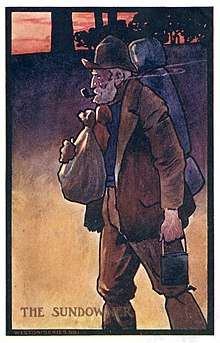Tucker bag
Tucker bag is a traditional Australian term for a storage bag used by travellers in the outback, typically a swagman or bushman, for carrying subsistence food.[1] In its basic design a tucker bag is a pouch or bag with a single entry typically closed with a drawstring, and may have been made of leather or oilskin.

"Sundowner" could be applied derogatively as meaning one who arrives at a station too late to do any useful work, but still expects a feed and top-up of the tuckerbag.
The tucker bag should not be confused with the swag, also carried by outback travellers, whether on foot, horse or pushbike, which may have comprised blankets (usually blue, hence "bluey", another name for a swag),[2] waterproof sheet, personal effects, and basic cooking implements such as a billy. The swag would generally be carried as a sausage-shaped roll slung over the shoulder, and the tucker bag in front.[1]
The term "tucker bag" appears in a number of traditional Australian songs and poems, including Waltzing Matilda "Whose is that jumbuck you've got in your tucker bag?", reflecting the tucker bag's place in Australian culture and history.
Tucker box
Bullockies and drivers of horse-drawn vehicles were not so constrained by the need for portability, so a greater quantity of food could be carried in a tucker box, as exemplified by the story of the Dog on the Tuckerbox. The contents would be similar, though: salt beef, tea, flour and sugar or golden syrup and perhaps tinned jam.[1]
Train crews' tucker boxes would contain more than food: a tin plate, pannikin (small pan or cup), eating utensils and toiletries. Most crews would not take meat with them but would buy it at the town where they ended their shift, since there were no refrigeration facilities on board.[3]
"Tucker box" has been a model of domestic chest freezer built in Australia under the Whirlpool brand name.[4]
See also
References
- W. S. Ramson, ed. (1988). The Australian National Dictionary. Oxford University Press. p. 691. ISBN 0195547365.
- William H. Wilde; Joy Hooton; Barry Andrews (1994). The Oxford Companion to Australian Literature. Oxford University Press. pp. 333, 550, 731. ISBN 019553381 X.
- McAuliffe, Des (1999). The Snowtown to Port Pirie Line. Adelaide: Modelling the Railways of South Australia Convention.:1–131
- "Advertising". The Australian Women's Weekly. Australia, Australia. 19 September 1973. p. 26. Retrieved 13 January 2020 – via Trove.